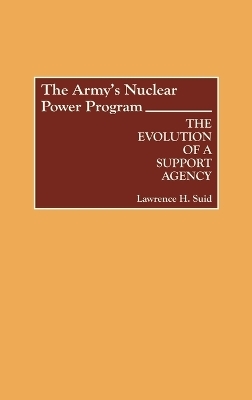
The Army's Nuclear Power Program
The Evolution of a Support Agency
Seiten
1990
Praeger Publishers Inc (Verlag)
978-0-313-27226-4 (ISBN)
Praeger Publishers Inc (Verlag)
978-0-313-27226-4 (ISBN)
This book examines the history and development of nuclear power from the perspective of the US Army's nuclear power programme, telling its story from the creation of the Office of Research and Development through the programme's days of growth, and on to its eventual decline.
On August 6 and August 9, 1945, the world became aware of the destructiveness of nuclear energy when the U.S. Army Air Corps dropped atomic bombs on Hiroshima and Nagasaki. Even before the bombs were detonated, though, President Harry Truman had directed his thoughts toward non-military uses of the atom, recognizing that the atomic bomb had given man a new understanding of the forces of nature. This book examines the history and development of nuclear power from the perspective of the U.S. Army's nuclear power program, telling its story from the creation of the Office of Research and Development through the program's days of growth,and on to its eventual decline.
This history examines the development of the United States Army's nuclear power program from its inception, through the development and operation of six small nuclear power plants throughout the Western Hemisphere, to its evolution into a military support agency. The Manhattan Project District Engineer, General Kenneth Nichols, who generated the idea for the program, worked for the development of atomic energy for peaceful purposes. From the initial plans to develop nuclear power plants at remote bases, the book traces the path the Army took in getting its proposals approved by the Atomic Energy Commission, formally organizing the nuclear program, and building a prototype of a nuclear power plant. Separate chapters are devoted to Fort Greely, the nuclear program at the height of its success and accomplishment, and its subsequent decline and transitional period. With its list of suggestions for further reading and a comprehensive index, this volume will be a valuable resource for courses in military history, energy issues, and the development of atomic power. It will also represent an important addition to college, university, and public libraries.
On August 6 and August 9, 1945, the world became aware of the destructiveness of nuclear energy when the U.S. Army Air Corps dropped atomic bombs on Hiroshima and Nagasaki. Even before the bombs were detonated, though, President Harry Truman had directed his thoughts toward non-military uses of the atom, recognizing that the atomic bomb had given man a new understanding of the forces of nature. This book examines the history and development of nuclear power from the perspective of the U.S. Army's nuclear power program, telling its story from the creation of the Office of Research and Development through the program's days of growth,and on to its eventual decline.
This history examines the development of the United States Army's nuclear power program from its inception, through the development and operation of six small nuclear power plants throughout the Western Hemisphere, to its evolution into a military support agency. The Manhattan Project District Engineer, General Kenneth Nichols, who generated the idea for the program, worked for the development of atomic energy for peaceful purposes. From the initial plans to develop nuclear power plants at remote bases, the book traces the path the Army took in getting its proposals approved by the Atomic Energy Commission, formally organizing the nuclear program, and building a prototype of a nuclear power plant. Separate chapters are devoted to Fort Greely, the nuclear program at the height of its success and accomplishment, and its subsequent decline and transitional period. With its list of suggestions for further reading and a comprehensive index, this volume will be a valuable resource for courses in military history, energy issues, and the development of atomic power. It will also represent an important addition to college, university, and public libraries.
LAWRENCE H. SUID is a Washington-based military historian and independent writer. He is the author of Guts & Glory, Scenes of Conflict, and The History of Armed Forces Radio and Television Service.
Preface
The Beginnings
Organization of the Nuclear Program
Building the Prototype
Fort Greely
The Nuclear Power Program in Full Bloom
The Nuclear Program in Decline
Transition
FESA
Bibliographic Essay
Index
| Erscheint lt. Verlag | 21.8.1990 |
|---|---|
| Reihe/Serie | Contributions in Military Studies |
| Sprache | englisch |
| Maße | 156 x 235 mm |
| Gewicht | 425 g |
| Themenwelt | Geschichte ► Teilgebiete der Geschichte ► Technikgeschichte |
| Sozialwissenschaften ► Politik / Verwaltung | |
| Technik ► Elektrotechnik / Energietechnik | |
| ISBN-10 | 0-313-27226-3 / 0313272263 |
| ISBN-13 | 978-0-313-27226-4 / 9780313272264 |
| Zustand | Neuware |
| Haben Sie eine Frage zum Produkt? |
Mehr entdecken
aus dem Bereich
aus dem Bereich
Buch | Softcover (2024)
Lehmanns Media (Verlag)
19,95 €
Vom Perceptron zum Deep Learning
Buch | Softcover (2022)
Springer Vieweg (Verlag)
19,99 €
Digitalisierung neu denken für eine gerechte Gesellschaft
Buch | Hardcover (2023)
Quadriga (Verlag)
20,00 €


